The Impact of Human Resource Management in the Hospitality Sector
VerifiedAdded on 2020/10/22
|12
|3602
|272
Report
AI Summary
This report provides a comprehensive overview of Human Resource Management (HRM) within the hospitality industry. It begins by defining HRM and its purpose, emphasizing its role in attracting, developing, and managing human resources to achieve organizational goals. The report then explores various key HRM functions, including planning, recruitment, selection, training and development, compensation, benefits, rewards, recognition, and the importance of maintaining a healthy and safe work environment. It also delves into employee and labor relations, motivation strategies, profiling techniques, and forecasting methods. The report highlights the significance of budget monitoring and adherence to employment laws, such as the Equality Act 2010, which protects against discrimination. Throughout the analysis, the report underscores the impact of effective HRM on organizational success, employee commitment, and overall business performance within the hospitality sector, using examples such as 'Only Chefs' recruitment platform.
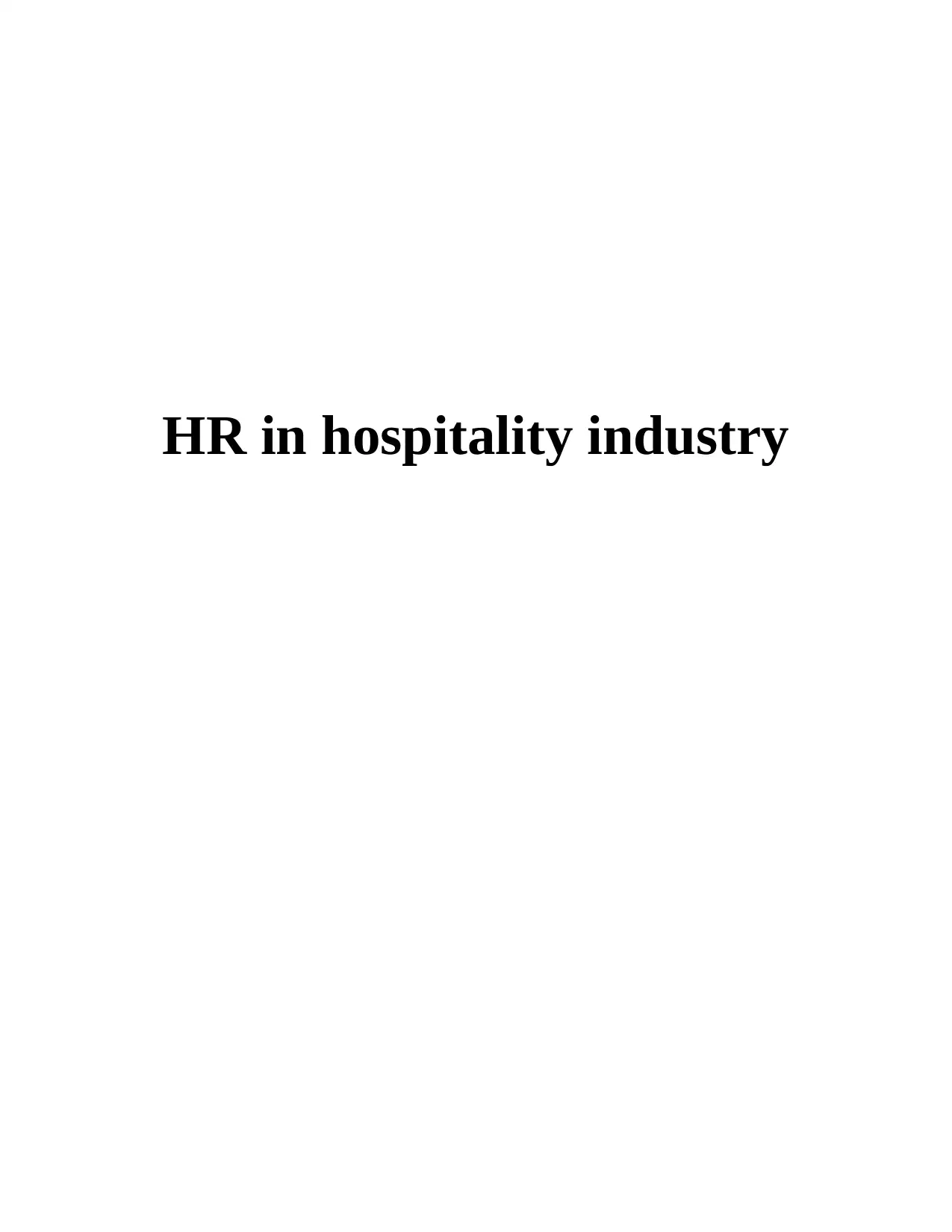
HR in hospitality industry
Paraphrase This Document
Need a fresh take? Get an instant paraphrase of this document with our AI Paraphraser
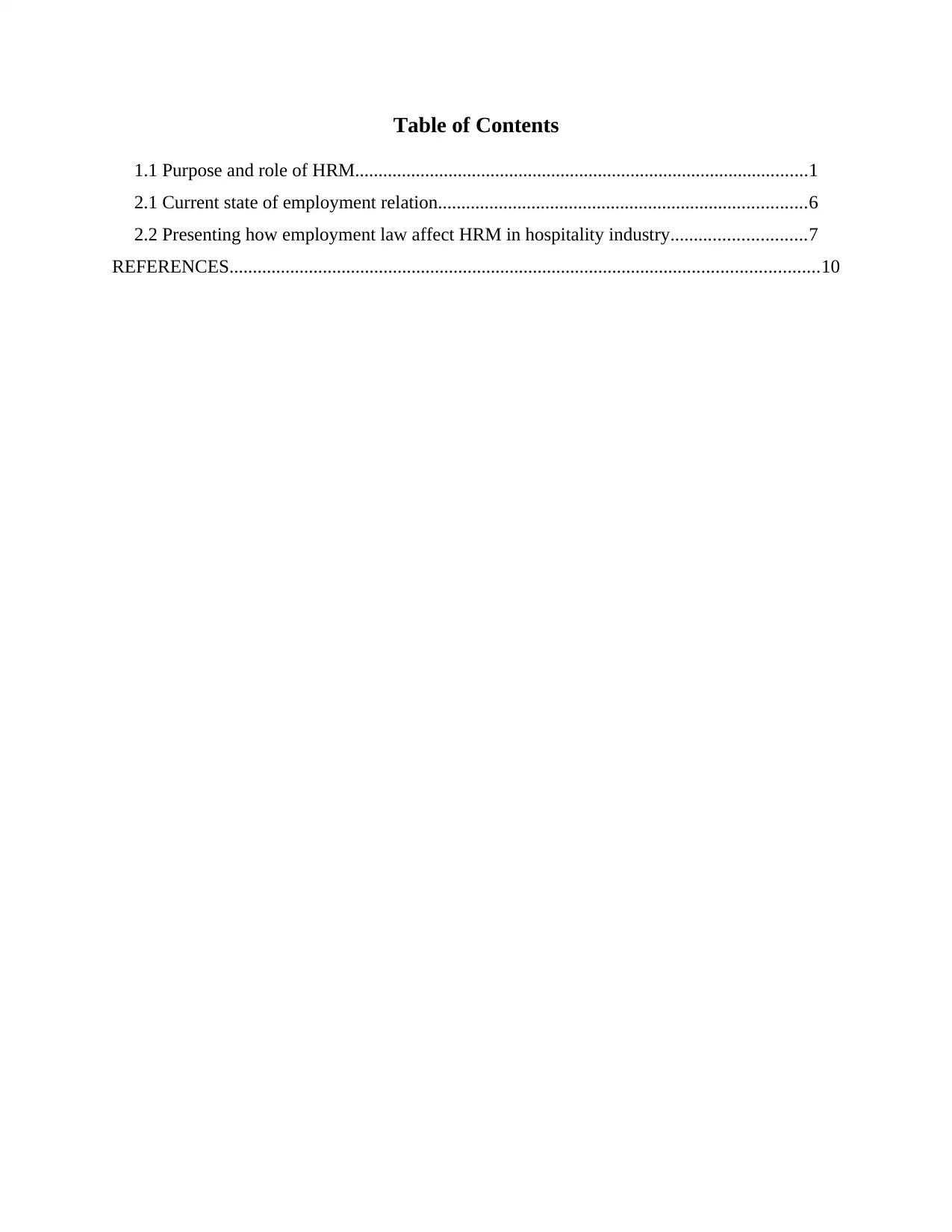
Table of Contents
1.1 Purpose and role of HRM.................................................................................................1
2.1 Current state of employment relation...............................................................................6
2.2 Presenting how employment law affect HRM in hospitality industry.............................7
REFERENCES..............................................................................................................................10
1.1 Purpose and role of HRM.................................................................................................1
2.1 Current state of employment relation...............................................................................6
2.2 Presenting how employment law affect HRM in hospitality industry.............................7
REFERENCES..............................................................................................................................10
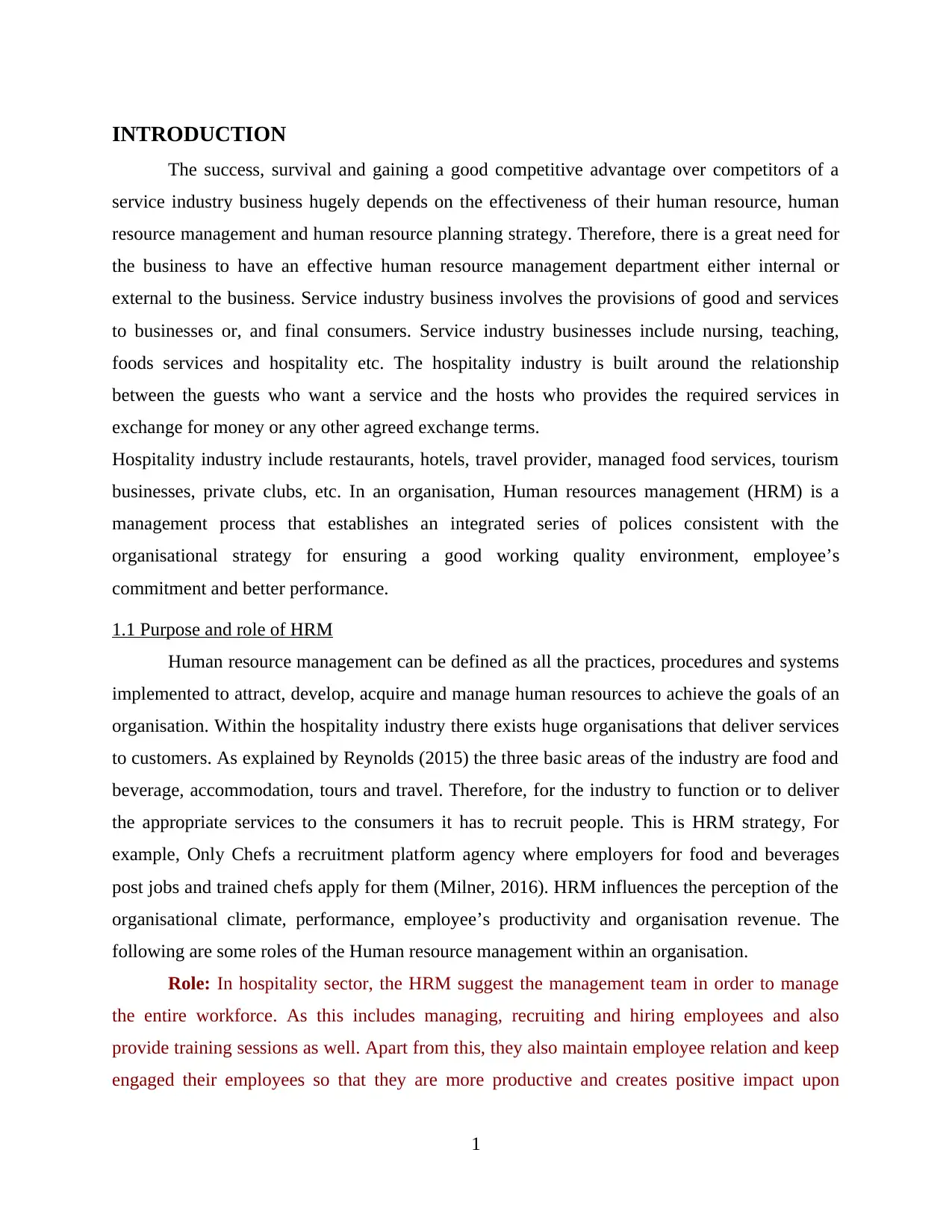
INTRODUCTION
The success, survival and gaining a good competitive advantage over competitors of a
service industry business hugely depends on the effectiveness of their human resource, human
resource management and human resource planning strategy. Therefore, there is a great need for
the business to have an effective human resource management department either internal or
external to the business. Service industry business involves the provisions of good and services
to businesses or, and final consumers. Service industry businesses include nursing, teaching,
foods services and hospitality etc. The hospitality industry is built around the relationship
between the guests who want a service and the hosts who provides the required services in
exchange for money or any other agreed exchange terms.
Hospitality industry include restaurants, hotels, travel provider, managed food services, tourism
businesses, private clubs, etc. In an organisation, Human resources management (HRM) is a
management process that establishes an integrated series of polices consistent with the
organisational strategy for ensuring a good working quality environment, employee’s
commitment and better performance.
1.1 Purpose and role of HRM
Human resource management can be defined as all the practices, procedures and systems
implemented to attract, develop, acquire and manage human resources to achieve the goals of an
organisation. Within the hospitality industry there exists huge organisations that deliver services
to customers. As explained by Reynolds (2015) the three basic areas of the industry are food and
beverage, accommodation, tours and travel. Therefore, for the industry to function or to deliver
the appropriate services to the consumers it has to recruit people. This is HRM strategy, For
example, Only Chefs a recruitment platform agency where employers for food and beverages
post jobs and trained chefs apply for them (Milner, 2016). HRM influences the perception of the
organisational climate, performance, employee’s productivity and organisation revenue. The
following are some roles of the Human resource management within an organisation.
Role: In hospitality sector, the HRM suggest the management team in order to manage
the entire workforce. As this includes managing, recruiting and hiring employees and also
provide training sessions as well. Apart from this, they also maintain employee relation and keep
engaged their employees so that they are more productive and creates positive impact upon
1
The success, survival and gaining a good competitive advantage over competitors of a
service industry business hugely depends on the effectiveness of their human resource, human
resource management and human resource planning strategy. Therefore, there is a great need for
the business to have an effective human resource management department either internal or
external to the business. Service industry business involves the provisions of good and services
to businesses or, and final consumers. Service industry businesses include nursing, teaching,
foods services and hospitality etc. The hospitality industry is built around the relationship
between the guests who want a service and the hosts who provides the required services in
exchange for money or any other agreed exchange terms.
Hospitality industry include restaurants, hotels, travel provider, managed food services, tourism
businesses, private clubs, etc. In an organisation, Human resources management (HRM) is a
management process that establishes an integrated series of polices consistent with the
organisational strategy for ensuring a good working quality environment, employee’s
commitment and better performance.
1.1 Purpose and role of HRM
Human resource management can be defined as all the practices, procedures and systems
implemented to attract, develop, acquire and manage human resources to achieve the goals of an
organisation. Within the hospitality industry there exists huge organisations that deliver services
to customers. As explained by Reynolds (2015) the three basic areas of the industry are food and
beverage, accommodation, tours and travel. Therefore, for the industry to function or to deliver
the appropriate services to the consumers it has to recruit people. This is HRM strategy, For
example, Only Chefs a recruitment platform agency where employers for food and beverages
post jobs and trained chefs apply for them (Milner, 2016). HRM influences the perception of the
organisational climate, performance, employee’s productivity and organisation revenue. The
following are some roles of the Human resource management within an organisation.
Role: In hospitality sector, the HRM suggest the management team in order to manage
the entire workforce. As this includes managing, recruiting and hiring employees and also
provide training sessions as well. Apart from this, they also maintain employee relation and keep
engaged their employees so that they are more productive and creates positive impact upon
1
⊘ This is a preview!⊘
Do you want full access?
Subscribe today to unlock all pages.

Trusted by 1+ million students worldwide
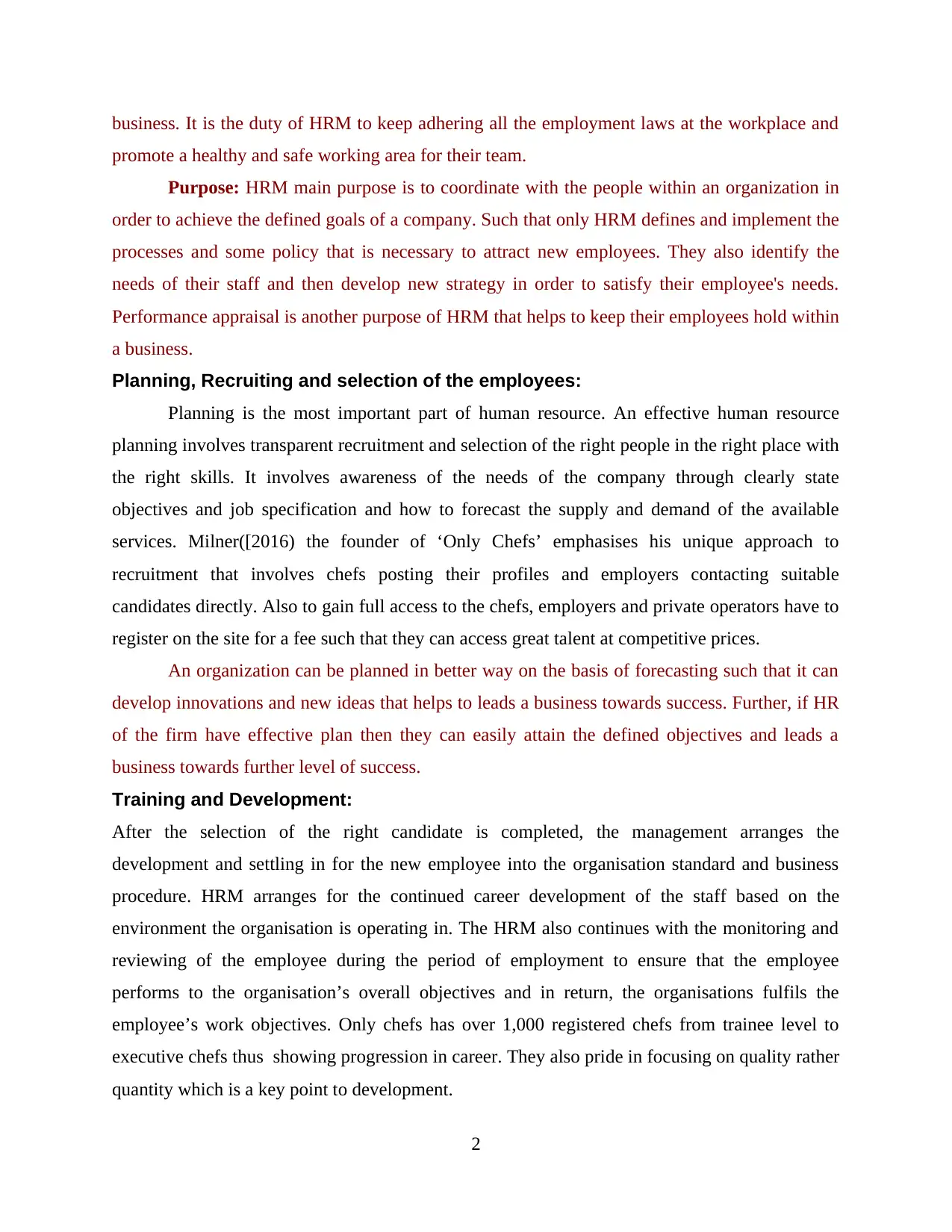
business. It is the duty of HRM to keep adhering all the employment laws at the workplace and
promote a healthy and safe working area for their team.
Purpose: HRM main purpose is to coordinate with the people within an organization in
order to achieve the defined goals of a company. Such that only HRM defines and implement the
processes and some policy that is necessary to attract new employees. They also identify the
needs of their staff and then develop new strategy in order to satisfy their employee's needs.
Performance appraisal is another purpose of HRM that helps to keep their employees hold within
a business.
Planning, Recruiting and selection of the employees:
Planning is the most important part of human resource. An effective human resource
planning involves transparent recruitment and selection of the right people in the right place with
the right skills. It involves awareness of the needs of the company through clearly state
objectives and job specification and how to forecast the supply and demand of the available
services. Milner([2016) the founder of ‘Only Chefs’ emphasises his unique approach to
recruitment that involves chefs posting their profiles and employers contacting suitable
candidates directly. Also to gain full access to the chefs, employers and private operators have to
register on the site for a fee such that they can access great talent at competitive prices.
An organization can be planned in better way on the basis of forecasting such that it can
develop innovations and new ideas that helps to leads a business towards success. Further, if HR
of the firm have effective plan then they can easily attain the defined objectives and leads a
business towards further level of success.
Training and Development:
After the selection of the right candidate is completed, the management arranges the
development and settling in for the new employee into the organisation standard and business
procedure. HRM arranges for the continued career development of the staff based on the
environment the organisation is operating in. The HRM also continues with the monitoring and
reviewing of the employee during the period of employment to ensure that the employee
performs to the organisation’s overall objectives and in return, the organisations fulfils the
employee’s work objectives. Only chefs has over 1,000 registered chefs from trainee level to
executive chefs thus showing progression in career. They also pride in focusing on quality rather
quantity which is a key point to development.
2
promote a healthy and safe working area for their team.
Purpose: HRM main purpose is to coordinate with the people within an organization in
order to achieve the defined goals of a company. Such that only HRM defines and implement the
processes and some policy that is necessary to attract new employees. They also identify the
needs of their staff and then develop new strategy in order to satisfy their employee's needs.
Performance appraisal is another purpose of HRM that helps to keep their employees hold within
a business.
Planning, Recruiting and selection of the employees:
Planning is the most important part of human resource. An effective human resource
planning involves transparent recruitment and selection of the right people in the right place with
the right skills. It involves awareness of the needs of the company through clearly state
objectives and job specification and how to forecast the supply and demand of the available
services. Milner([2016) the founder of ‘Only Chefs’ emphasises his unique approach to
recruitment that involves chefs posting their profiles and employers contacting suitable
candidates directly. Also to gain full access to the chefs, employers and private operators have to
register on the site for a fee such that they can access great talent at competitive prices.
An organization can be planned in better way on the basis of forecasting such that it can
develop innovations and new ideas that helps to leads a business towards success. Further, if HR
of the firm have effective plan then they can easily attain the defined objectives and leads a
business towards further level of success.
Training and Development:
After the selection of the right candidate is completed, the management arranges the
development and settling in for the new employee into the organisation standard and business
procedure. HRM arranges for the continued career development of the staff based on the
environment the organisation is operating in. The HRM also continues with the monitoring and
reviewing of the employee during the period of employment to ensure that the employee
performs to the organisation’s overall objectives and in return, the organisations fulfils the
employee’s work objectives. Only chefs has over 1,000 registered chefs from trainee level to
executive chefs thus showing progression in career. They also pride in focusing on quality rather
quantity which is a key point to development.
2
Paraphrase This Document
Need a fresh take? Get an instant paraphrase of this document with our AI Paraphraser
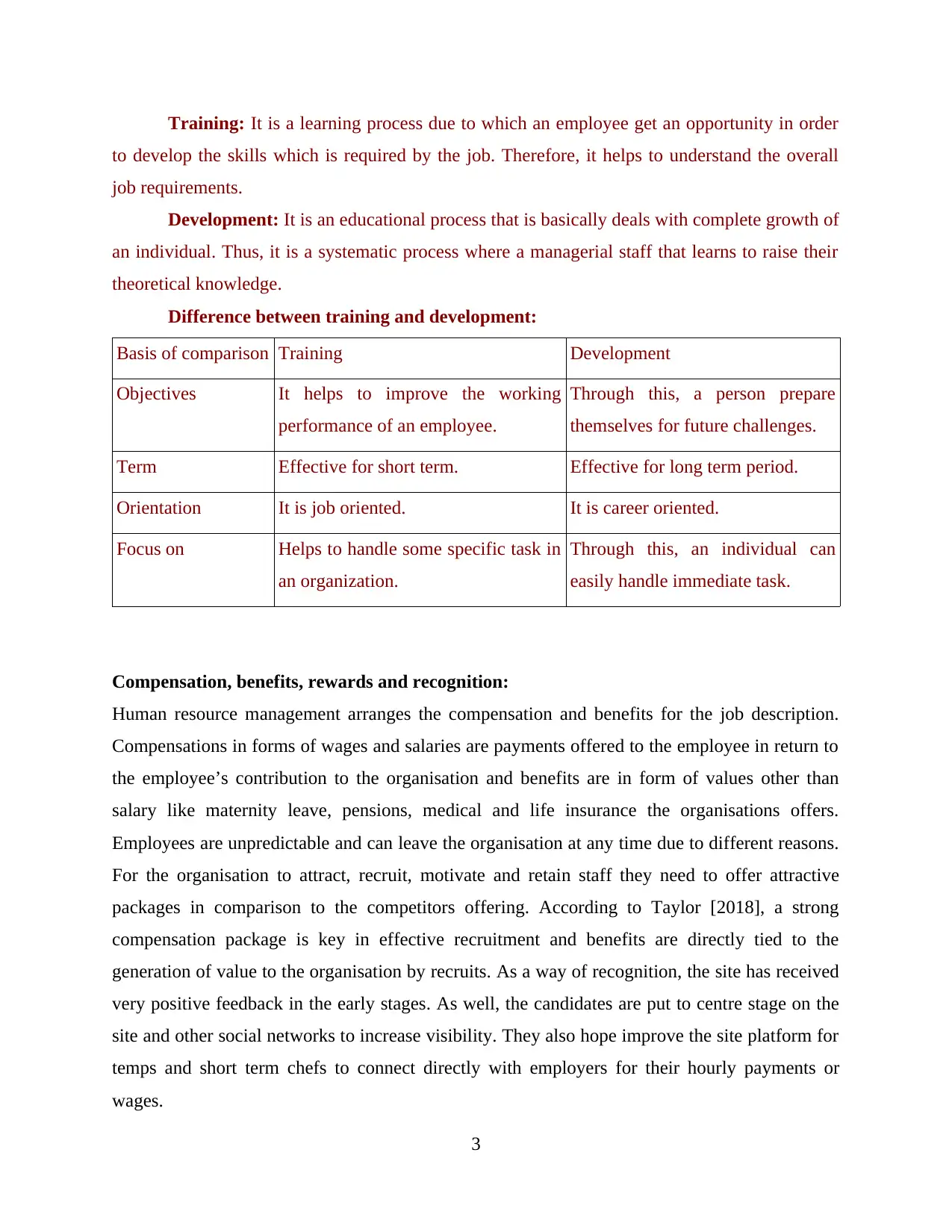
Training: It is a learning process due to which an employee get an opportunity in order
to develop the skills which is required by the job. Therefore, it helps to understand the overall
job requirements.
Development: It is an educational process that is basically deals with complete growth of
an individual. Thus, it is a systematic process where a managerial staff that learns to raise their
theoretical knowledge.
Difference between training and development:
Basis of comparison Training Development
Objectives It helps to improve the working
performance of an employee.
Through this, a person prepare
themselves for future challenges.
Term Effective for short term. Effective for long term period.
Orientation It is job oriented. It is career oriented.
Focus on Helps to handle some specific task in
an organization.
Through this, an individual can
easily handle immediate task.
Compensation, benefits, rewards and recognition:
Human resource management arranges the compensation and benefits for the job description.
Compensations in forms of wages and salaries are payments offered to the employee in return to
the employee’s contribution to the organisation and benefits are in form of values other than
salary like maternity leave, pensions, medical and life insurance the organisations offers.
Employees are unpredictable and can leave the organisation at any time due to different reasons.
For the organisation to attract, recruit, motivate and retain staff they need to offer attractive
packages in comparison to the competitors offering. According to Taylor [2018], a strong
compensation package is key in effective recruitment and benefits are directly tied to the
generation of value to the organisation by recruits. As a way of recognition, the site has received
very positive feedback in the early stages. As well, the candidates are put to centre stage on the
site and other social networks to increase visibility. They also hope improve the site platform for
temps and short term chefs to connect directly with employers for their hourly payments or
wages.
3
to develop the skills which is required by the job. Therefore, it helps to understand the overall
job requirements.
Development: It is an educational process that is basically deals with complete growth of
an individual. Thus, it is a systematic process where a managerial staff that learns to raise their
theoretical knowledge.
Difference between training and development:
Basis of comparison Training Development
Objectives It helps to improve the working
performance of an employee.
Through this, a person prepare
themselves for future challenges.
Term Effective for short term. Effective for long term period.
Orientation It is job oriented. It is career oriented.
Focus on Helps to handle some specific task in
an organization.
Through this, an individual can
easily handle immediate task.
Compensation, benefits, rewards and recognition:
Human resource management arranges the compensation and benefits for the job description.
Compensations in forms of wages and salaries are payments offered to the employee in return to
the employee’s contribution to the organisation and benefits are in form of values other than
salary like maternity leave, pensions, medical and life insurance the organisations offers.
Employees are unpredictable and can leave the organisation at any time due to different reasons.
For the organisation to attract, recruit, motivate and retain staff they need to offer attractive
packages in comparison to the competitors offering. According to Taylor [2018], a strong
compensation package is key in effective recruitment and benefits are directly tied to the
generation of value to the organisation by recruits. As a way of recognition, the site has received
very positive feedback in the early stages. As well, the candidates are put to centre stage on the
site and other social networks to increase visibility. They also hope improve the site platform for
temps and short term chefs to connect directly with employers for their hourly payments or
wages.
3
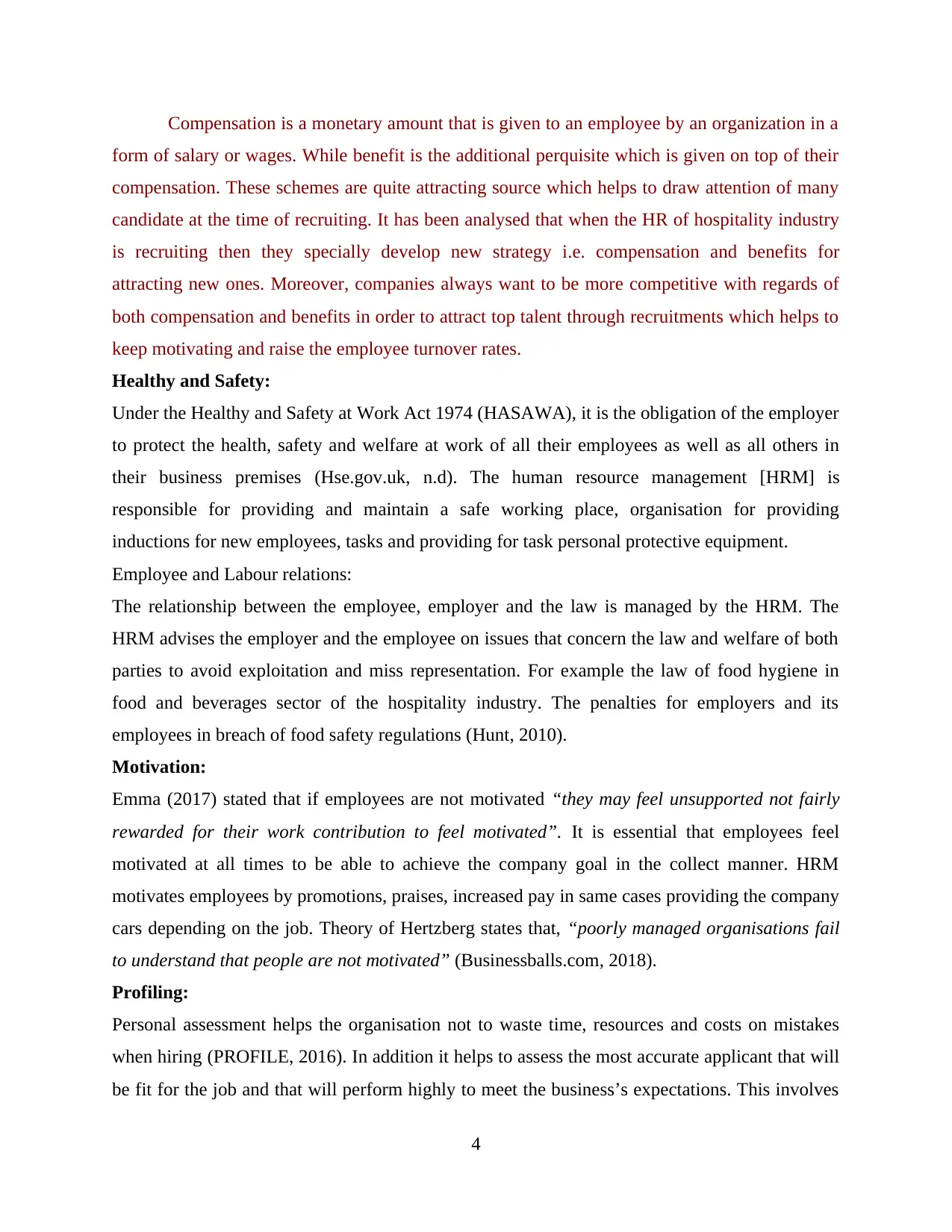
Compensation is a monetary amount that is given to an employee by an organization in a
form of salary or wages. While benefit is the additional perquisite which is given on top of their
compensation. These schemes are quite attracting source which helps to draw attention of many
candidate at the time of recruiting. It has been analysed that when the HR of hospitality industry
is recruiting then they specially develop new strategy i.e. compensation and benefits for
attracting new ones. Moreover, companies always want to be more competitive with regards of
both compensation and benefits in order to attract top talent through recruitments which helps to
keep motivating and raise the employee turnover rates.
Healthy and Safety:
Under the Healthy and Safety at Work Act 1974 (HASAWA), it is the obligation of the employer
to protect the health, safety and welfare at work of all their employees as well as all others in
their business premises (Hse.gov.uk, n.d). The human resource management [HRM] is
responsible for providing and maintain a safe working place, organisation for providing
inductions for new employees, tasks and providing for task personal protective equipment.
Employee and Labour relations:
The relationship between the employee, employer and the law is managed by the HRM. The
HRM advises the employer and the employee on issues that concern the law and welfare of both
parties to avoid exploitation and miss representation. For example the law of food hygiene in
food and beverages sector of the hospitality industry. The penalties for employers and its
employees in breach of food safety regulations (Hunt, 2010).
Motivation:
Emma (2017) stated that if employees are not motivated “they may feel unsupported not fairly
rewarded for their work contribution to feel motivated”. It is essential that employees feel
motivated at all times to be able to achieve the company goal in the collect manner. HRM
motivates employees by promotions, praises, increased pay in same cases providing the company
cars depending on the job. Theory of Hertzberg states that, “poorly managed organisations fail
to understand that people are not motivated” (Businessballs.com, 2018).
Profiling:
Personal assessment helps the organisation not to waste time, resources and costs on mistakes
when hiring (PROFILE, 2016). In addition it helps to assess the most accurate applicant that will
be fit for the job and that will perform highly to meet the business’s expectations. This involves
4
form of salary or wages. While benefit is the additional perquisite which is given on top of their
compensation. These schemes are quite attracting source which helps to draw attention of many
candidate at the time of recruiting. It has been analysed that when the HR of hospitality industry
is recruiting then they specially develop new strategy i.e. compensation and benefits for
attracting new ones. Moreover, companies always want to be more competitive with regards of
both compensation and benefits in order to attract top talent through recruitments which helps to
keep motivating and raise the employee turnover rates.
Healthy and Safety:
Under the Healthy and Safety at Work Act 1974 (HASAWA), it is the obligation of the employer
to protect the health, safety and welfare at work of all their employees as well as all others in
their business premises (Hse.gov.uk, n.d). The human resource management [HRM] is
responsible for providing and maintain a safe working place, organisation for providing
inductions for new employees, tasks and providing for task personal protective equipment.
Employee and Labour relations:
The relationship between the employee, employer and the law is managed by the HRM. The
HRM advises the employer and the employee on issues that concern the law and welfare of both
parties to avoid exploitation and miss representation. For example the law of food hygiene in
food and beverages sector of the hospitality industry. The penalties for employers and its
employees in breach of food safety regulations (Hunt, 2010).
Motivation:
Emma (2017) stated that if employees are not motivated “they may feel unsupported not fairly
rewarded for their work contribution to feel motivated”. It is essential that employees feel
motivated at all times to be able to achieve the company goal in the collect manner. HRM
motivates employees by promotions, praises, increased pay in same cases providing the company
cars depending on the job. Theory of Hertzberg states that, “poorly managed organisations fail
to understand that people are not motivated” (Businessballs.com, 2018).
Profiling:
Personal assessment helps the organisation not to waste time, resources and costs on mistakes
when hiring (PROFILE, 2016). In addition it helps to assess the most accurate applicant that will
be fit for the job and that will perform highly to meet the business’s expectations. This involves
4
⊘ This is a preview!⊘
Do you want full access?
Subscribe today to unlock all pages.

Trusted by 1+ million students worldwide
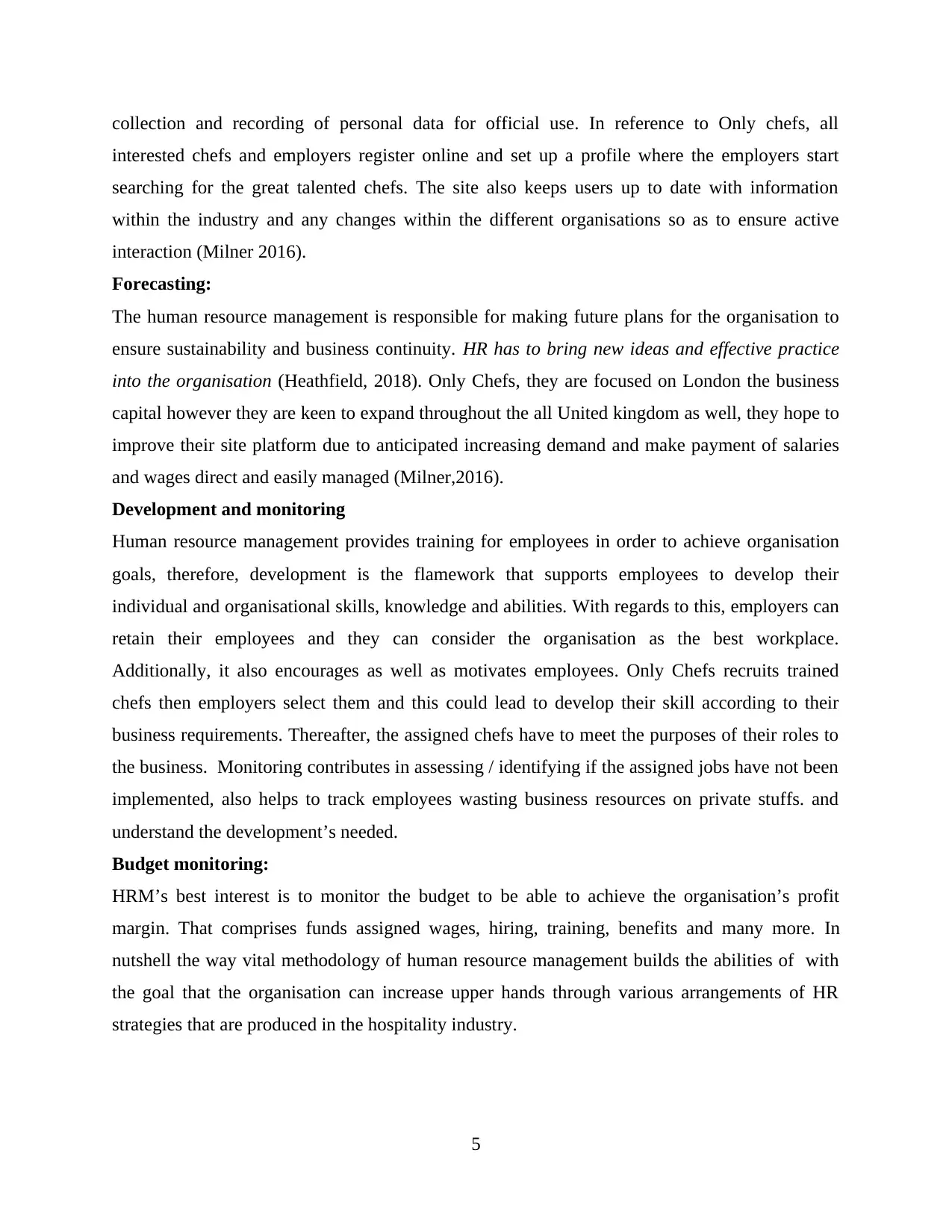
collection and recording of personal data for official use. In reference to Only chefs, all
interested chefs and employers register online and set up a profile where the employers start
searching for the great talented chefs. The site also keeps users up to date with information
within the industry and any changes within the different organisations so as to ensure active
interaction (Milner 2016).
Forecasting:
The human resource management is responsible for making future plans for the organisation to
ensure sustainability and business continuity. HR has to bring new ideas and effective practice
into the organisation (Heathfield, 2018). Only Chefs, they are focused on London the business
capital however they are keen to expand throughout the all United kingdom as well, they hope to
improve their site platform due to anticipated increasing demand and make payment of salaries
and wages direct and easily managed (Milner,2016).
Development and monitoring
Human resource management provides training for employees in order to achieve organisation
goals, therefore, development is the flamework that supports employees to develop their
individual and organisational skills, knowledge and abilities. With regards to this, employers can
retain their employees and they can consider the organisation as the best workplace.
Additionally, it also encourages as well as motivates employees. Only Chefs recruits trained
chefs then employers select them and this could lead to develop their skill according to their
business requirements. Thereafter, the assigned chefs have to meet the purposes of their roles to
the business. Monitoring contributes in assessing / identifying if the assigned jobs have not been
implemented, also helps to track employees wasting business resources on private stuffs. and
understand the development’s needed.
Budget monitoring:
HRM’s best interest is to monitor the budget to be able to achieve the organisation’s profit
margin. That comprises funds assigned wages, hiring, training, benefits and many more. In
nutshell the way vital methodology of human resource management builds the abilities of with
the goal that the organisation can increase upper hands through various arrangements of HR
strategies that are produced in the hospitality industry.
5
interested chefs and employers register online and set up a profile where the employers start
searching for the great talented chefs. The site also keeps users up to date with information
within the industry and any changes within the different organisations so as to ensure active
interaction (Milner 2016).
Forecasting:
The human resource management is responsible for making future plans for the organisation to
ensure sustainability and business continuity. HR has to bring new ideas and effective practice
into the organisation (Heathfield, 2018). Only Chefs, they are focused on London the business
capital however they are keen to expand throughout the all United kingdom as well, they hope to
improve their site platform due to anticipated increasing demand and make payment of salaries
and wages direct and easily managed (Milner,2016).
Development and monitoring
Human resource management provides training for employees in order to achieve organisation
goals, therefore, development is the flamework that supports employees to develop their
individual and organisational skills, knowledge and abilities. With regards to this, employers can
retain their employees and they can consider the organisation as the best workplace.
Additionally, it also encourages as well as motivates employees. Only Chefs recruits trained
chefs then employers select them and this could lead to develop their skill according to their
business requirements. Thereafter, the assigned chefs have to meet the purposes of their roles to
the business. Monitoring contributes in assessing / identifying if the assigned jobs have not been
implemented, also helps to track employees wasting business resources on private stuffs. and
understand the development’s needed.
Budget monitoring:
HRM’s best interest is to monitor the budget to be able to achieve the organisation’s profit
margin. That comprises funds assigned wages, hiring, training, benefits and many more. In
nutshell the way vital methodology of human resource management builds the abilities of with
the goal that the organisation can increase upper hands through various arrangements of HR
strategies that are produced in the hospitality industry.
5
Paraphrase This Document
Need a fresh take? Get an instant paraphrase of this document with our AI Paraphraser
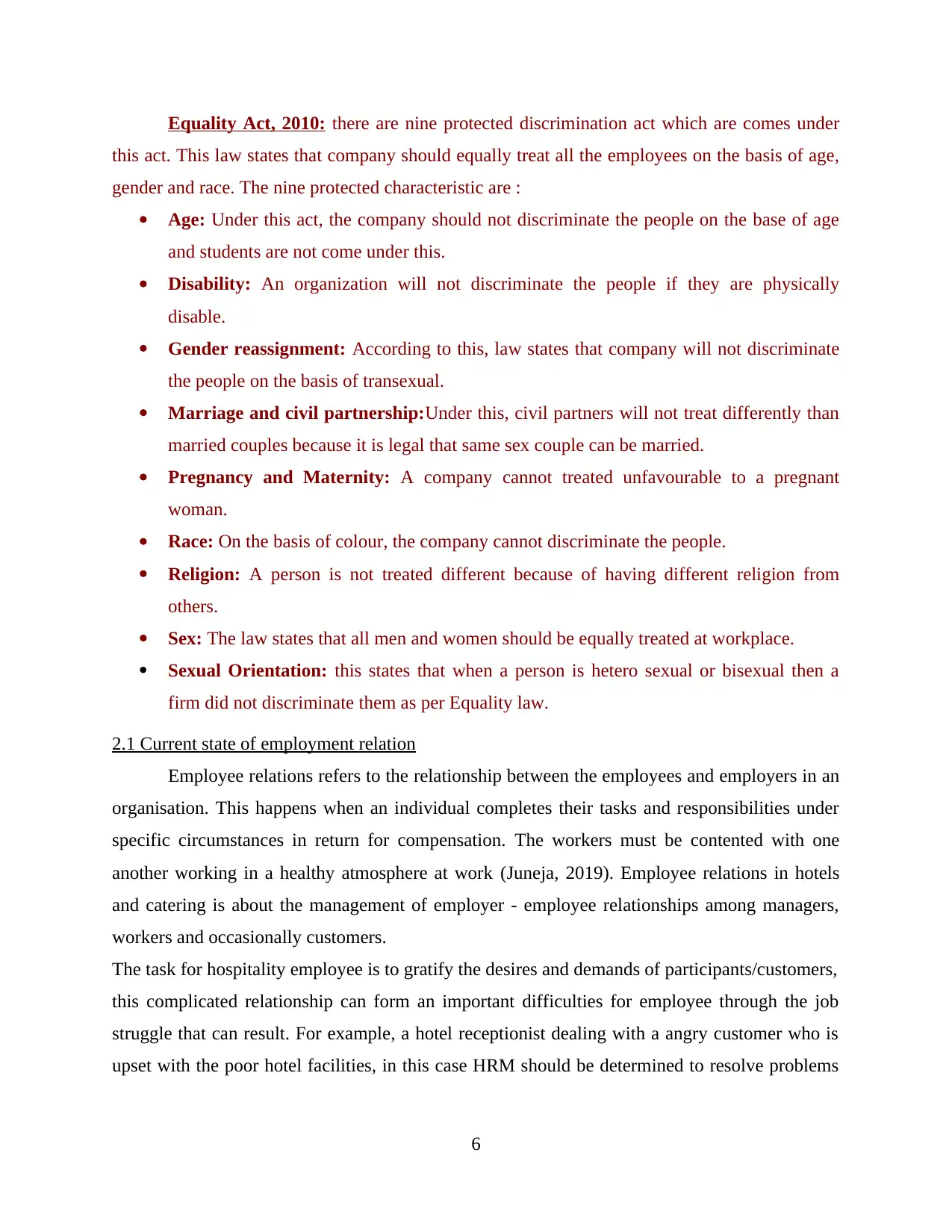
Equality Act, 2010: there are nine protected discrimination act which are comes under
this act. This law states that company should equally treat all the employees on the basis of age,
gender and race. The nine protected characteristic are :
Age: Under this act, the company should not discriminate the people on the base of age
and students are not come under this.
Disability: An organization will not discriminate the people if they are physically
disable.
Gender reassignment: According to this, law states that company will not discriminate
the people on the basis of transexual.
Marriage and civil partnership:Under this, civil partners will not treat differently than
married couples because it is legal that same sex couple can be married.
Pregnancy and Maternity: A company cannot treated unfavourable to a pregnant
woman.
Race: On the basis of colour, the company cannot discriminate the people.
Religion: A person is not treated different because of having different religion from
others.
Sex: The law states that all men and women should be equally treated at workplace.
Sexual Orientation: this states that when a person is hetero sexual or bisexual then a
firm did not discriminate them as per Equality law.
2.1 Current state of employment relation
Employee relations refers to the relationship between the employees and employers in an
organisation. This happens when an individual completes their tasks and responsibilities under
specific circumstances in return for compensation. The workers must be contented with one
another working in a healthy atmosphere at work (Juneja, 2019). Employee relations in hotels
and catering is about the management of employer - employee relationships among managers,
workers and occasionally customers.
The task for hospitality employee is to gratify the desires and demands of participants/customers,
this complicated relationship can form an important difficulties for employee through the job
struggle that can result. For example, a hotel receptionist dealing with a angry customer who is
upset with the poor hotel facilities, in this case HRM should be determined to resolve problems
6
this act. This law states that company should equally treat all the employees on the basis of age,
gender and race. The nine protected characteristic are :
Age: Under this act, the company should not discriminate the people on the base of age
and students are not come under this.
Disability: An organization will not discriminate the people if they are physically
disable.
Gender reassignment: According to this, law states that company will not discriminate
the people on the basis of transexual.
Marriage and civil partnership:Under this, civil partners will not treat differently than
married couples because it is legal that same sex couple can be married.
Pregnancy and Maternity: A company cannot treated unfavourable to a pregnant
woman.
Race: On the basis of colour, the company cannot discriminate the people.
Religion: A person is not treated different because of having different religion from
others.
Sex: The law states that all men and women should be equally treated at workplace.
Sexual Orientation: this states that when a person is hetero sexual or bisexual then a
firm did not discriminate them as per Equality law.
2.1 Current state of employment relation
Employee relations refers to the relationship between the employees and employers in an
organisation. This happens when an individual completes their tasks and responsibilities under
specific circumstances in return for compensation. The workers must be contented with one
another working in a healthy atmosphere at work (Juneja, 2019). Employee relations in hotels
and catering is about the management of employer - employee relationships among managers,
workers and occasionally customers.
The task for hospitality employee is to gratify the desires and demands of participants/customers,
this complicated relationship can form an important difficulties for employee through the job
struggle that can result. For example, a hotel receptionist dealing with a angry customer who is
upset with the poor hotel facilities, in this case HRM should be determined to resolve problems
6
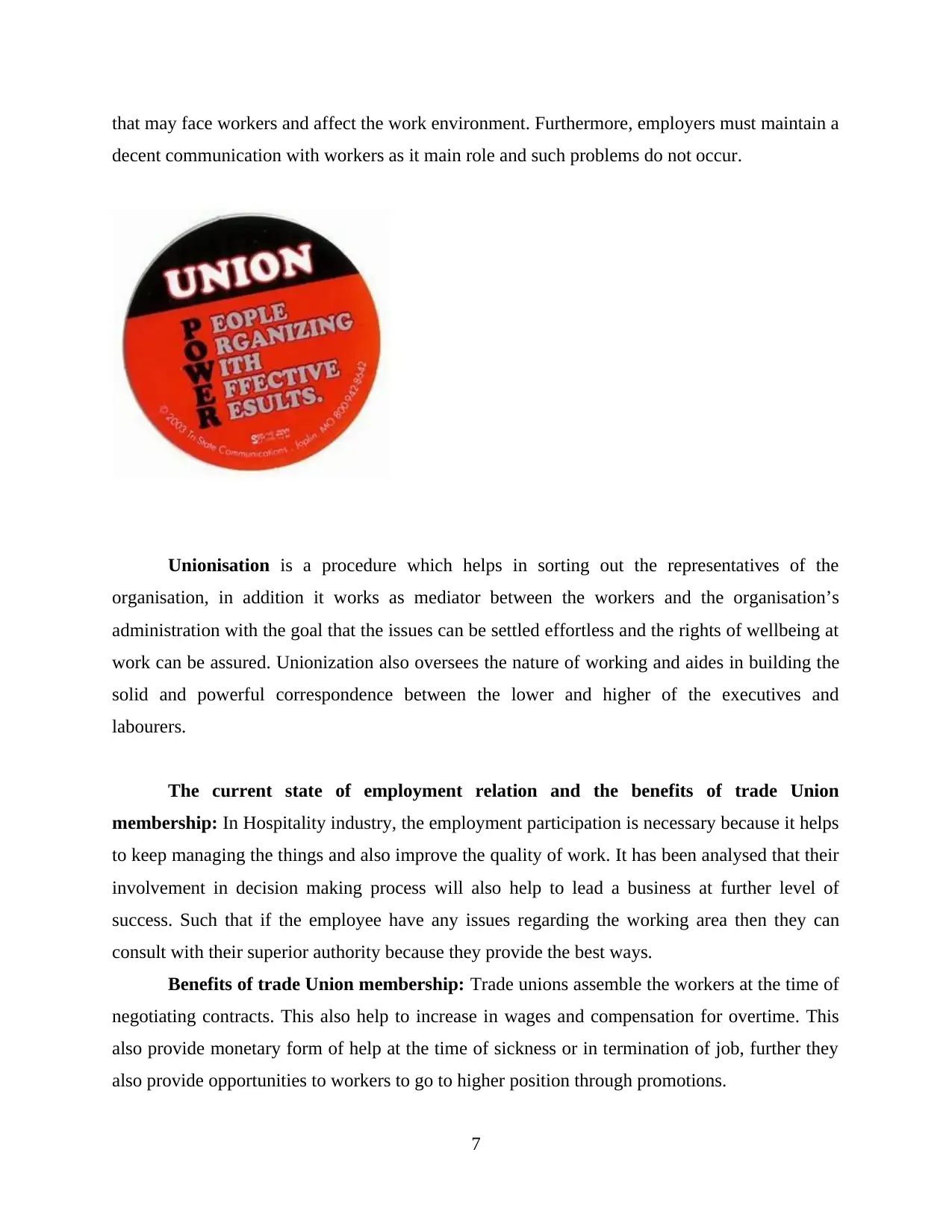
that may face workers and affect the work environment. Furthermore, employers must maintain a
decent communication with workers as it main role and such problems do not occur.
Unionisation is a procedure which helps in sorting out the representatives of the
organisation, in addition it works as mediator between the workers and the organisation’s
administration with the goal that the issues can be settled effortless and the rights of wellbeing at
work can be assured. Unionization also oversees the nature of working and aides in building the
solid and powerful correspondence between the lower and higher of the executives and
labourers.
The current state of employment relation and the benefits of trade Union
membership: In Hospitality industry, the employment participation is necessary because it helps
to keep managing the things and also improve the quality of work. It has been analysed that their
involvement in decision making process will also help to lead a business at further level of
success. Such that if the employee have any issues regarding the working area then they can
consult with their superior authority because they provide the best ways.
Benefits of trade Union membership: Trade unions assemble the workers at the time of
negotiating contracts. This also help to increase in wages and compensation for overtime. This
also provide monetary form of help at the time of sickness or in termination of job, further they
also provide opportunities to workers to go to higher position through promotions.
7
decent communication with workers as it main role and such problems do not occur.
Unionisation is a procedure which helps in sorting out the representatives of the
organisation, in addition it works as mediator between the workers and the organisation’s
administration with the goal that the issues can be settled effortless and the rights of wellbeing at
work can be assured. Unionization also oversees the nature of working and aides in building the
solid and powerful correspondence between the lower and higher of the executives and
labourers.
The current state of employment relation and the benefits of trade Union
membership: In Hospitality industry, the employment participation is necessary because it helps
to keep managing the things and also improve the quality of work. It has been analysed that their
involvement in decision making process will also help to lead a business at further level of
success. Such that if the employee have any issues regarding the working area then they can
consult with their superior authority because they provide the best ways.
Benefits of trade Union membership: Trade unions assemble the workers at the time of
negotiating contracts. This also help to increase in wages and compensation for overtime. This
also provide monetary form of help at the time of sickness or in termination of job, further they
also provide opportunities to workers to go to higher position through promotions.
7
⊘ This is a preview!⊘
Do you want full access?
Subscribe today to unlock all pages.

Trusted by 1+ million students worldwide
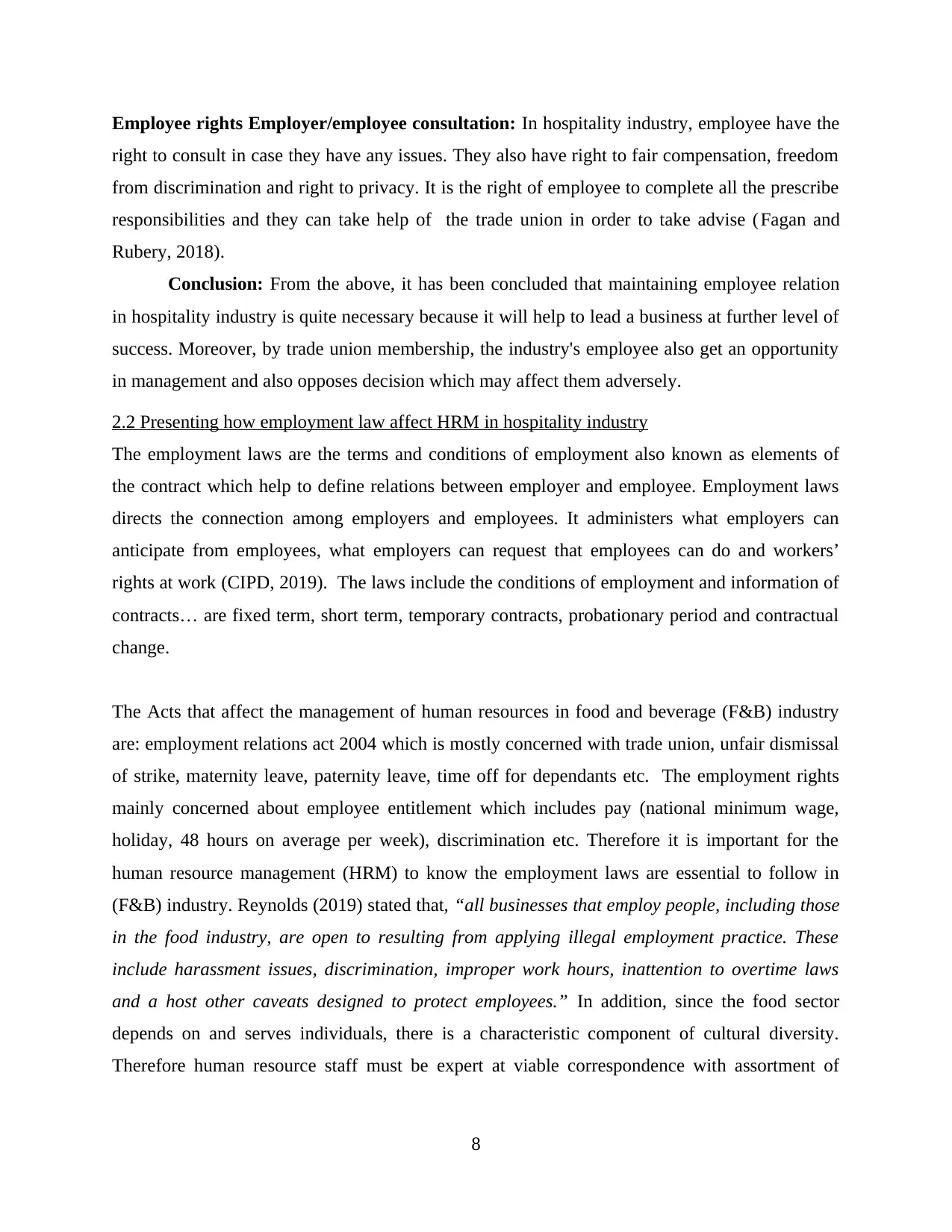
Employee rights Employer/employee consultation: In hospitality industry, employee have the
right to consult in case they have any issues. They also have right to fair compensation, freedom
from discrimination and right to privacy. It is the right of employee to complete all the prescribe
responsibilities and they can take help of the trade union in order to take advise (Fagan and
Rubery, 2018).
Conclusion: From the above, it has been concluded that maintaining employee relation
in hospitality industry is quite necessary because it will help to lead a business at further level of
success. Moreover, by trade union membership, the industry's employee also get an opportunity
in management and also opposes decision which may affect them adversely.
2.2 Presenting how employment law affect HRM in hospitality industry
The employment laws are the terms and conditions of employment also known as elements of
the contract which help to define relations between employer and employee. Employment laws
directs the connection among employers and employees. It administers what employers can
anticipate from employees, what employers can request that employees can do and workers’
rights at work (CIPD, 2019). The laws include the conditions of employment and information of
contracts… are fixed term, short term, temporary contracts, probationary period and contractual
change.
The Acts that affect the management of human resources in food and beverage (F&B) industry
are: employment relations act 2004 which is mostly concerned with trade union, unfair dismissal
of strike, maternity leave, paternity leave, time off for dependants etc. The employment rights
mainly concerned about employee entitlement which includes pay (national minimum wage,
holiday, 48 hours on average per week), discrimination etc. Therefore it is important for the
human resource management (HRM) to know the employment laws are essential to follow in
(F&B) industry. Reynolds (2019) stated that, “all businesses that employ people, including those
in the food industry, are open to resulting from applying illegal employment practice. These
include harassment issues, discrimination, improper work hours, inattention to overtime laws
and a host other caveats designed to protect employees.” In addition, since the food sector
depends on and serves individuals, there is a characteristic component of cultural diversity.
Therefore human resource staff must be expert at viable correspondence with assortment of
8
right to consult in case they have any issues. They also have right to fair compensation, freedom
from discrimination and right to privacy. It is the right of employee to complete all the prescribe
responsibilities and they can take help of the trade union in order to take advise (Fagan and
Rubery, 2018).
Conclusion: From the above, it has been concluded that maintaining employee relation
in hospitality industry is quite necessary because it will help to lead a business at further level of
success. Moreover, by trade union membership, the industry's employee also get an opportunity
in management and also opposes decision which may affect them adversely.
2.2 Presenting how employment law affect HRM in hospitality industry
The employment laws are the terms and conditions of employment also known as elements of
the contract which help to define relations between employer and employee. Employment laws
directs the connection among employers and employees. It administers what employers can
anticipate from employees, what employers can request that employees can do and workers’
rights at work (CIPD, 2019). The laws include the conditions of employment and information of
contracts… are fixed term, short term, temporary contracts, probationary period and contractual
change.
The Acts that affect the management of human resources in food and beverage (F&B) industry
are: employment relations act 2004 which is mostly concerned with trade union, unfair dismissal
of strike, maternity leave, paternity leave, time off for dependants etc. The employment rights
mainly concerned about employee entitlement which includes pay (national minimum wage,
holiday, 48 hours on average per week), discrimination etc. Therefore it is important for the
human resource management (HRM) to know the employment laws are essential to follow in
(F&B) industry. Reynolds (2019) stated that, “all businesses that employ people, including those
in the food industry, are open to resulting from applying illegal employment practice. These
include harassment issues, discrimination, improper work hours, inattention to overtime laws
and a host other caveats designed to protect employees.” In addition, since the food sector
depends on and serves individuals, there is a characteristic component of cultural diversity.
Therefore human resource staff must be expert at viable correspondence with assortment of
8
Paraphrase This Document
Need a fresh take? Get an instant paraphrase of this document with our AI Paraphraser
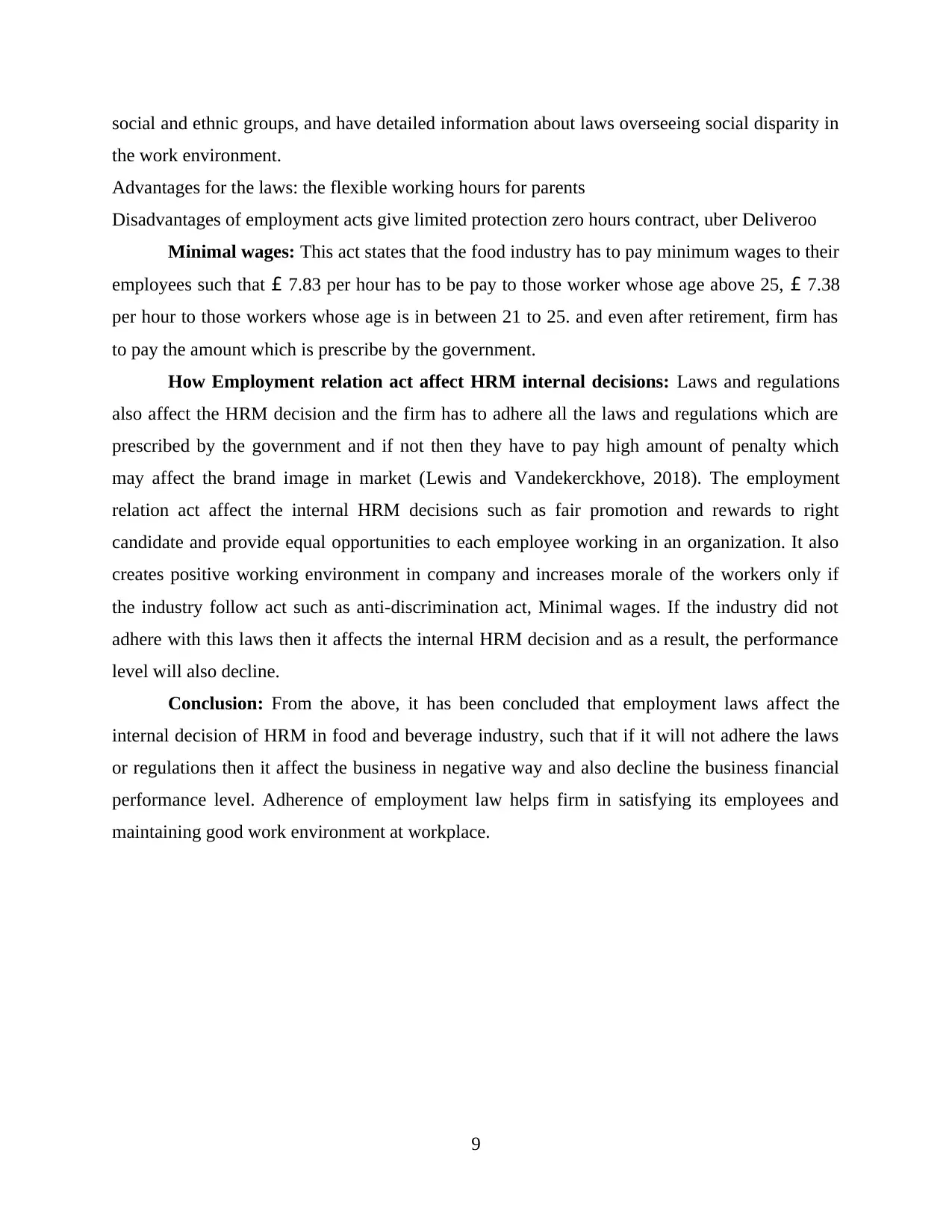
social and ethnic groups, and have detailed information about laws overseeing social disparity in
the work environment.
Advantages for the laws: the flexible working hours for parents
Disadvantages of employment acts give limited protection zero hours contract, uber Deliveroo
Minimal wages: This act states that the food industry has to pay minimum wages to their
employees such that £ 7.83 per hour has to be pay to those worker whose age above 25, £ 7.38
per hour to those workers whose age is in between 21 to 25. and even after retirement, firm has
to pay the amount which is prescribe by the government.
How Employment relation act affect HRM internal decisions: Laws and regulations
also affect the HRM decision and the firm has to adhere all the laws and regulations which are
prescribed by the government and if not then they have to pay high amount of penalty which
may affect the brand image in market (Lewis and Vandekerckhove, 2018). The employment
relation act affect the internal HRM decisions such as fair promotion and rewards to right
candidate and provide equal opportunities to each employee working in an organization. It also
creates positive working environment in company and increases morale of the workers only if
the industry follow act such as anti-discrimination act, Minimal wages. If the industry did not
adhere with this laws then it affects the internal HRM decision and as a result, the performance
level will also decline.
Conclusion: From the above, it has been concluded that employment laws affect the
internal decision of HRM in food and beverage industry, such that if it will not adhere the laws
or regulations then it affect the business in negative way and also decline the business financial
performance level. Adherence of employment law helps firm in satisfying its employees and
maintaining good work environment at workplace.
9
the work environment.
Advantages for the laws: the flexible working hours for parents
Disadvantages of employment acts give limited protection zero hours contract, uber Deliveroo
Minimal wages: This act states that the food industry has to pay minimum wages to their
employees such that £ 7.83 per hour has to be pay to those worker whose age above 25, £ 7.38
per hour to those workers whose age is in between 21 to 25. and even after retirement, firm has
to pay the amount which is prescribe by the government.
How Employment relation act affect HRM internal decisions: Laws and regulations
also affect the HRM decision and the firm has to adhere all the laws and regulations which are
prescribed by the government and if not then they have to pay high amount of penalty which
may affect the brand image in market (Lewis and Vandekerckhove, 2018). The employment
relation act affect the internal HRM decisions such as fair promotion and rewards to right
candidate and provide equal opportunities to each employee working in an organization. It also
creates positive working environment in company and increases morale of the workers only if
the industry follow act such as anti-discrimination act, Minimal wages. If the industry did not
adhere with this laws then it affects the internal HRM decision and as a result, the performance
level will also decline.
Conclusion: From the above, it has been concluded that employment laws affect the
internal decision of HRM in food and beverage industry, such that if it will not adhere the laws
or regulations then it affect the business in negative way and also decline the business financial
performance level. Adherence of employment law helps firm in satisfying its employees and
maintaining good work environment at workplace.
9
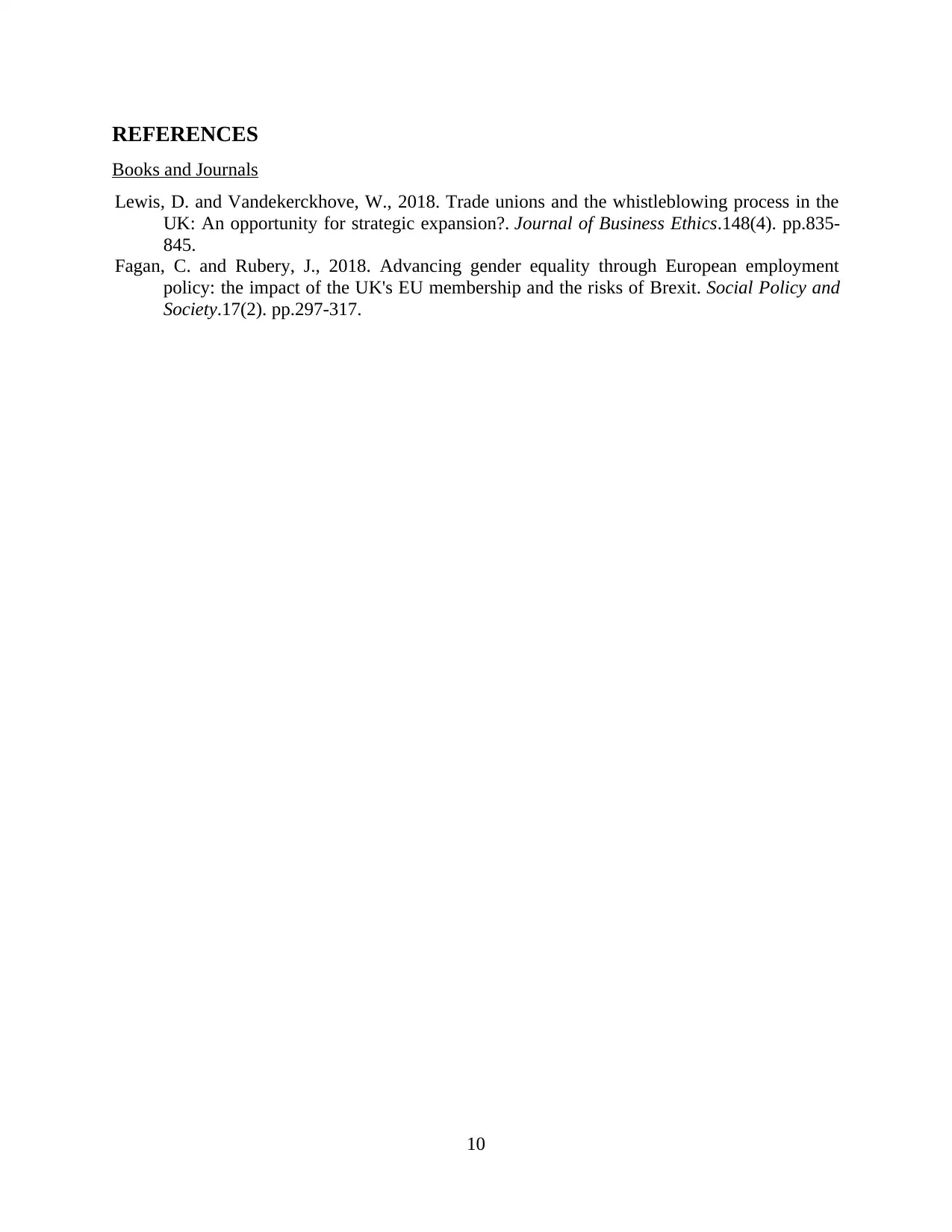
REFERENCES
Books and Journals
Lewis, D. and Vandekerckhove, W., 2018. Trade unions and the whistleblowing process in the
UK: An opportunity for strategic expansion?. Journal of Business Ethics.148(4). pp.835-
845.
Fagan, C. and Rubery, J., 2018. Advancing gender equality through European employment
policy: the impact of the UK's EU membership and the risks of Brexit. Social Policy and
Society.17(2). pp.297-317.
10
Books and Journals
Lewis, D. and Vandekerckhove, W., 2018. Trade unions and the whistleblowing process in the
UK: An opportunity for strategic expansion?. Journal of Business Ethics.148(4). pp.835-
845.
Fagan, C. and Rubery, J., 2018. Advancing gender equality through European employment
policy: the impact of the UK's EU membership and the risks of Brexit. Social Policy and
Society.17(2). pp.297-317.
10
⊘ This is a preview!⊘
Do you want full access?
Subscribe today to unlock all pages.

Trusted by 1+ million students worldwide
1 out of 12
Related Documents
Your All-in-One AI-Powered Toolkit for Academic Success.
+13062052269
info@desklib.com
Available 24*7 on WhatsApp / Email
![[object Object]](/_next/static/media/star-bottom.7253800d.svg)
Unlock your academic potential
Copyright © 2020–2026 A2Z Services. All Rights Reserved. Developed and managed by ZUCOL.




